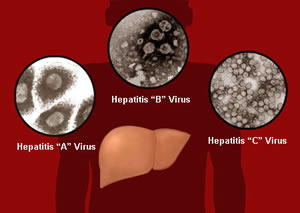Difference between Hepatitis A and B
Key difference: Hepatitis is a disease caused by various viruses. It mainly causes inflammation of the liver and is characterized by the presence of inflammatory cells in the tissue of the liver. The condition may be self-limiting, which means that it heals on its own over time or it may lead to fibrosis, i.e. scarring of the liver and cirrhosis. There are five different viruses that cause hepatitis: hepatitis A virus (HAV), hepatitis B virus (HBV), hepatitis C virus (HCV), hepatitis D virus (HDV) and hepatitis E virus (HEV). However, hepatitis can also be caused by toxic substances, such as alcohol, certain medications, some industrial organic solvents, plants, other infections and autoimmune diseases.
 Hepatitis is a disease caused by various viruses. It mainly causes inflammation of the liver and is characterized by the presence of inflammatory cells in the tissue of the liver. The condition may be self-limiting, which means that it heals on its own over time or it may lead to fibrosis, i.e. scarring of the liver and cirrhosis.
Hepatitis is a disease caused by various viruses. It mainly causes inflammation of the liver and is characterized by the presence of inflammatory cells in the tissue of the liver. The condition may be self-limiting, which means that it heals on its own over time or it may lead to fibrosis, i.e. scarring of the liver and cirrhosis.
People with hepatitis may or may show symptoms, in fact majority of the affected show limited or no symptoms. However, in those that do show symptoms, the common symptoms can include jaundice, anorexia, loss of appetite, malaise, abdominal pain, nausea, fever, diarrhea, fatigue, etc.
There are five different viruses that cause hepatitis: hepatitis A virus (HAV), hepatitis B virus (HBV), hepatitis C virus (HCV), hepatitis D virus (HDV) and hepatitis E virus (HEV). However, hepatitis can also be caused by toxic substances, such as alcohol, certain medications, some industrial organic solvents, plants, other infections and autoimmune diseases.
 All the various types of hepatitis can cause similar symptoms, hence it is quite difficult of diagnose the cause of the condition. However, blood test checking for levels of antibodies as particular to the individual viruses can help diagnose the responsible virus. However, the viruses have different modes of transmission and can affect the liver differently.
All the various types of hepatitis can cause similar symptoms, hence it is quite difficult of diagnose the cause of the condition. However, blood test checking for levels of antibodies as particular to the individual viruses can help diagnose the responsible virus. However, the viruses have different modes of transmission and can affect the liver differently.
Hepatitis can be acute or chronic. Acute hepatitis is when it lasts less than six months and chronic when it persists longer. Hepatitis A appears only as an acute or newly occurring infection and does not become chronic. It also does not require treatment. Hepatitis B and Hepatitis C can also begin as acute infections, however in some cases may turn into chronic diseases and cause long-term liver problems. Hepatitis D only affects people with Hepatitis B, and Hepatitis E is quite similar to Hepatitis A.
A detailed comparison of Hepatitis A and Hepatitis B:
|
|
Hepatitis A |
Hepatitis B |
|
Description |
Hepatitis A is inflammation of the liver caused by the hepatitis A virus. It can range in severity from a mild illness lasting a few weeks to a severe illness lasting several months. However, it is rarely fatal. |
Hepatitis B is a contagious liver disease that results from infection with the Hepatitis B virus (HBV). It can range in severity from a mild illness lasting a few weeks to a serious, lifelong illness. Hepatitis B can be either “acute” or “chronic”. |
|
Causes |
The hepatitis A virus is found in the stool of people with hepatitis A. It is most commonly transmitted in drinking water or food contaminated with the stool containing the virus. |
Hepatitis B is a sexually transmitted disease (STD). It is spread by contact with an infected person's blood, semen, or other body fluid. |
|
Risk |
Living with an infected person. Having sex, especially anal with an infected person. Traveling to countries where hepatitis A is common. Injecting and non-injecting drug users. Children and employees in child care settings. People who had a Hepatitis A infection in the last six to nine months. |
Hepatitis B virus is transmitted between people by direct blood-to-blood contact or semen and vaginal fluid of an infected person. Hepatitis B is an important occupational hazard for health workers. common modes of transmission are: Perinatal (from mother to baby at birth) Early childhood infections (inapparent infection through close interpersonal contact with infected household contacts) Unsafe injection practices Unsafe blood transfusions Unprotected sexual contact. |
|
Prevention |
Vaccination against hepatitis A is available and recommended for people at risk, who are above the age of 1 year. Also maintain physical hygiene, and avoid drinking impure water or uncooked food. |
Hepatitis B vaccine is main prevention technique for Hepatitis B. |
|
Symptoms |
· Jaundice (condition causing yellow eyes and skin, dark urine) · Abdominal pain · Loss of appetite · Nausea · Fever · Diarrhea · Fatigue |
Most people do not experience any symptoms during the acute infection phase. Symptoms last several weeks, and include: Yellowing of the skin and eyes (jaundice), dark urine, extreme fatigue, nausea, vomiting and abdominal pain. |
|
Diagnosis |
Blood tests can used to diagnose hepatitis A. |
Blood tests to test for antibodies to the hepatitis B surface antigen or for antibodies to the hepatitis B core antigen. |
|
Treatment |
Hepatitis A causes acute (short-lived) infection. The liver heals itself over a few weeks to months. No treatment is |
There is no specific treatment for acute hepatitis B. Care is aimed at maintaining comfort and adequate nutritional balance, including replacement of fluids that are lost from vomiting and diarrhoea. Some people with chronic hepatitis B can be treated with drugs, including interferon and antiviral agents. |
|
Statistics |
Globally, there are an estimated 1.4 million cases of hepatitis A every year. |
Two billion people worldwide have been infected with the virus and about 600 000 people die every year due to the consequences of hepatitis B. The hepatitis B virus is 50 to 100 times more infectious than HIV. |
Image Courtesy: healthlob.com, hepatit.com









Add new comment